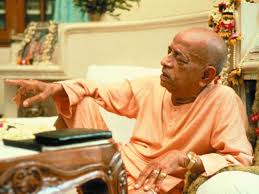SB 3.9.10 purport…Therefore, one who is not situated in the principles of devotional service to the Lord should not pose himself as a religious leader of the innocent public. The Īśopaniṣad emphatically forbids this nonsense in the following mantra:
andhaṁ tamaḥ praviśanti ye ’sambhūtim upāsate tato bhūya iva te tamo ya u sambhūtyāṁ ratāḥ (Īśopaniṣad 12) A person in ignorance of the principles of religion who therefore does nothing in the matter of religion is far better than a person who misguides others in the name of religion without reference to the factual religious principles of devotional service. Such so-called leaders of religion are sure to be condemned by Brahmā and other great authorities.
————————————————–
SB 3.9.11-O my Lord, Your devotees can see You through the ears by the process of bona fide hearing, and thus their hearts become cleansed, and You take Your seat there. You are so merciful to Your devotees that You manifest Yourself in the particular eternal form of transcendence in which they always think of You.
PURPORT-…The Lord sits on the lotus heart of the devotee in the eternal form the pure devotee desires, and thus the Lord does not part from the devotee, as confirmed in the previous verse. The Lord, however, does not disclose Himself to a casual or unauthentic worshiper to be exploited. This is confirmed in Bhagavad-gītā (7.25): nāhaṁ prakāśaḥ sarvasya yoga-māyā-samāvṛtaḥ. Rather, by yoga-māyā, the Lord remains concealed to the nondevotees or casual devotees who are serving their sense gratification. The Lord is never visible to the pseudodevotees who worship the demigods in charge of universal affairs. The conclusion is that the Lord cannot become the order supplier of a pseudodevotee, but He is always prepared to respond to the desires of a pure, unconditional devotee, who is free from all tinges of material infection.
SB 3.9.12 purport…The Lord does not want any one of His innumerable sons (the living entities) to remain in the material world of threefold miseries to perpetually suffer the material pangs of birth, death, old age and disease. The demigods in the heavenly planets, and many devotees on this planet also, want to remain in the material world as devotees of the Lord and take advantage of material happiness. They do so at a risk of falling down to the lower status of existence, and this makes the Lord dissatisfied with them.
Pure devotees are not desirous of any material enjoyment, nor are they averse to it. They completely dovetail their desires with the desires of the Lord and perform nothing on their personal account.
… The demigods are called sakāma devotees, or devotees with material desires in mind, while the pure devotees are called niṣkāma devotees because they have no desires for their personal interests. The sakāma devotees are self-interested because they do not think of others, and therefore they are not able to satisfy the Lord perfectly, whereas the pure devotees take the missionary responsibility of turning nondevotees into devotees, and they are therefore able to satisfy the Lord more than the demigods. The Lord is unmindful of the nondevotees, although He is sitting within everyone’s heart as well-wisher and Supersoul.
SB 3.9.13 purport…Anything done on account of the Lord is a permanent asset and accumulates in the form of unseen piety for gradual promotion to the unalloyed devotional service of the Lord. These undetected pious activities will one day result in full-fledged devotional service by the grace of the Supreme Lord. Therefore, any pious act done on account of the Supreme Lord is also recommended here for those who are not pure devotees.



